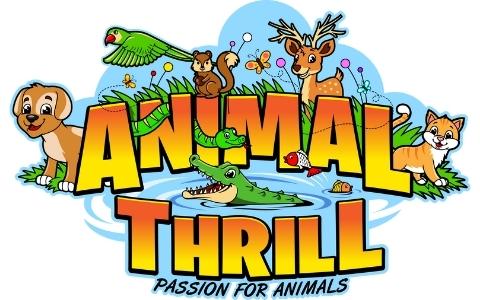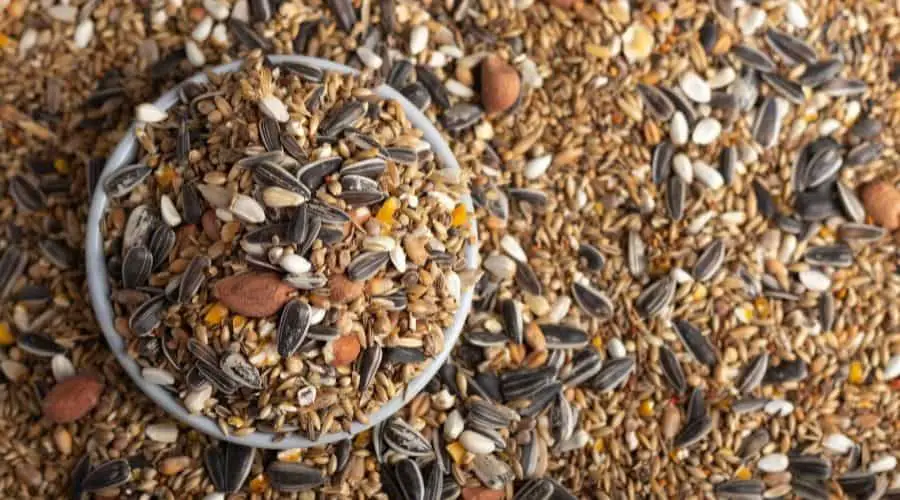Mold and fungal spores are everywhere on earth, including inside your birdseed. Once mold or fungus starts growing inside your feeders, it can rapidly make birds sick.
Not only is it essential to change the seed regularly, but you need to get rid of it properly. How do you dispose of old bird seed? I will walk you through the process, so you don’t make birds sick by accident.
The best way to dispose of old bird seed is by composting it before it gets moldy. Only untreated and unsprouted bird seed should be composted. Unfortunately, if you throw old seeds out in your yard, it can make local birds and wildlife ill and it will attract unwanted animals to your yard.
Table of Contents
What To Do With Old Bird Seed
One of the best and only things you can do with old bird seed is to dispose of it. You can tell birdseed is getting old if it sprouts.
Birds don’t eat sprouted bird seed because their stomachs aren’t well equipped to handle breaking it down, so if you can see sprouts, pull them out or change the feed entirely.
Another obvious sign that your birdseed is too old is the presence of any mold or fungus. If you see signs of these problematic growths, you need to remove and replace the food immediately.
Never let a bird eat moldy food. Also, it would be best to check the container it came from to ensure the food inside is still good. If not, please replace it for your pet’s health.
Finally, you can sometimes tell birdseed has gone off just by inspecting it. Bird seed comes in many colors, but none of them should ever change in storage. Discolored bird food is a bad sign.
While you’re looking, please give it a sniff. Birdseed smells mild and slightly nutty when it’s fresh.
Likewise, stale but still edible birdseed has a minimal aroma that isn’t bad, but if your bird seed stinks, get rid of it immediately.
Can Old Bird Seed Be Composted
Composting is one of the best options for disposing of old bird seed. However, it is essential to check your bird seed first.
Only untreated and unsprouted seed is compostable. Moreover, you can compost moldy bird seed too, so it doesn’t have to go to waste in the trash.
There are some types of birdseed you shouldn’t compost. For example, if your seed got contaminated by something toxic, it’s not safe to compost.
Similarly, if the bird seed was treated with any chemicals, it doesn’t belong in a compost pile. Fortunately, most bird seed is pretty plain.
I recommend keeping an airtight container near your birdcages or wherever you clean and change their food and water.
By doing this, you make it easy to toss old bird seed inside for composting. Once you have enough to make an extra trip, you can carry the birdseed to wherever you are composting outside.
Pro Tip: Suet cakes cannot be part of your compost. While they are made mainly of birdseed, the suet is an animal product. According to Discover Grassland, “Suet is the crumbly, hard, and saturated fat found around animal kidneys. It’s most commonly taken from cows and sheep…” While this is perfectly safe for birds to eat, you don’t want any animal fats in your compost pile.
Can I Just Throw Old Birdseed In The Yard
If the old bird seed you want to throw is stale or past its expiration date, but nothing else is obviously wrong with it, you could throw it in your yard.
However, this is not the best idea. Wild birds will happily eat the seed you throw out, but they are not alone.
When you dump bird seed in your yard regularly, it attracts more than birds. You could end up with a yard full of insects, pests, and rodents who all come for the abundant treat that is your old bird seed.
More importantly, where there are pests, there are predators that eat them. Neighborhood cats, wild animals like coyotes, and snakes tend to follow the food, so you could gain more problems than you solve by throwing out a few handfuls of outdated seeds.
If you plan to throw birdseed in your yard, there’s a chance you will accidentally regrow some of it. Because bird seed is seed, there’s a chance it will sprout and grow anywhere you toss it.
This can be beneficial. In fact, green-thumbed bird owners can plant old seeds and regrow many types of bird feed. How well it grows will depend on the grower’s skill, variety of seeds, and how well they are suited to your climate.
How To Dispose Of Moldy Bird Seed
You can efficiently dispose of old bird seed on a compost pile. Those who don’t have a compost pile or have seed with non-compostable problems like mildew or a bug infestation need to remove and isolate the seed before disposal.
This can be as simple as dumping it in a used plastic grocery bag and tying it off. Remember to check the bag for holes and throw it away.
After you dispose of bad seed, it’s essential to clean up. It is best to wash your food containers with hot water and dish soap. I recommend antibacterial Dawn because it is gentle on animals but tough on germs and bacteria.
Helpful Tips To Know About How To Dispose Of Old Bird Seed
Disposing of old bird seed is the only smart choice if you want healthy pets and wildlife. It’s essential to identify the specific problem so you can choose the best disposal method.
Here are more helpful tips to know about how to dispose of old bird seed.
- You can check the packaging on your birdseed for an expiration date. Keeping track of when it’s outdated can often help prevent you from dealing with rotted or spoiled bird seed.
- If the food in a permanent container, like a storage bin, goes off, it’s vital to clean the container thoroughly with soap and water and then sterilize it. You can use white vinegar to sterilize surfaces for birds safely.
- Seeds have oils that can become rancid. Unfortunately, this is both a food problem and a potential issue for your container as well. If you use plastic to keep your bird seed longer, it’s important to understand that the oils from the seed will absorb into the porous plastic over time. I recommend getting an easy-to-wash metal seed holder.
Final Thoughts
You should never feed birds expired bird seed because it could make them sick, especially if it’s sprouted, moldy, or has fungus growing inside.
Disposing of old bird seed is vital for the health of pets and local wildlife. Sadly, tossing it out in the yard is asking for trouble.
Wild birds could eat it and get sick, but it will also attract rodents and insects that eat tiny seeds. Too many rodents in your yard can invite diseases or snakes, and no one wants that.
Fortunately, you can easily rotate your seed and compost whatever doesn’t get eaten. The hard outer shells take a while to break down, and you need to ensure the seed is not going to sprout or contaminate your compost with chemicals.
Still, correctly composted old bird seed will just be more fertile soil for your garden beds.

